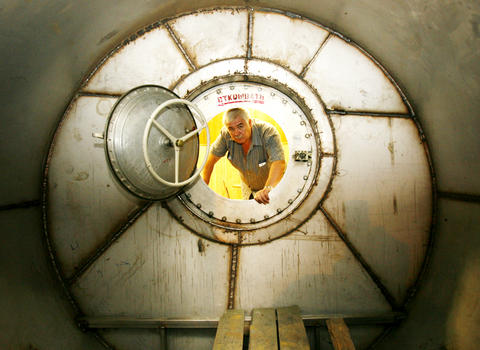Wanted: volunteers willing to spend 520 days in a sex-free barrel. Applicants need to be fluent in English and Russian. No TV but books and films available.
It might sound like another dysfunctional reality-TV series but Russia's space agency is sifting through thousands of applications from would-be astronauts prepared to simulate an epic and far-distant manned mission to Mars. Instead of setting foot on the Red Planet, the astronauts will reside in a cramped barrel-shaped spacecraft in central Moscow. The tiny modules are designed to replicate the psychological pressures of a long space voyage. The astronauts will be locked inside for a year and a half: 250 days to Mars, followed by a month on the surface, and 240 days to get back.
Mark Belakovsky, head of the Mars 500 project, said Thursday: "We want applicants who are healthy and professional. They have to be intellectually tough."

PHOTO: AFP
Belakovsky, of the Institute of Biomedical Problems, said male and female applicants had to be aged 25 to 50. Doctors would be preferred, he said.
"We've had applicants from Britain," he added. "If British firms would like to supply us with books, films, or food we would be happy to hear from them."
The institute and the European Space Agency (ESA) are separately considering applications for the mock voyage as well as two experiments in November and early 2008, also with crews of six.
ESA will select two of the six crew members. "So far, 4,600 people have applied. Most say that they've been interested in space flight since childhood but for personal reasons haven't got round to it," an ESA spokeswoman said.
Once the main study gets under way crew members will remain on board for the duration, barring emergencies. "They will have taken off, and that's it," Belakovsky said.
Astronauts will be exposed to all aspects of life in space, apart from radiation and weightlessness. Communicating with mission control will be subject to a 20-minute delay: the time taken to send a signal to Earth. Before they "land," three astronauts destined to "live" on Mars will spend a month in a separate module, lying on their backs with their heads lower than their feet to simulate zero gravity.
The crew will spend most of their time in a 150m3 living module, which has personal cabins, as well as a common room and kitchen. Volunteers will be paid for taking part in the study.
All food and water will be taken on board before the trip. Alcohol and smoking will be forbidden, and sex frowned upon. "It's not a reality show - it is a serious pioneering research experiment," Belakovsky said, adding that there would be moments of tension. "If you and your girlfriend were to shut yourselves in a room for three days, five days, a month - believe me, you would have a million problems. Either she would strangle you or you would strangle her."
Belakovsky conceded that a real manned mission to Mars was unlikely to get under way before the late 2020s. In 2004, US President George Bush described landing on Mars as a long-term goal of Nasa. The European Space Agency hopes to get humans there by 2035.
In the meantime, experts are unsure whether Mars, which has polar ice caps that make it the most Earth-like planet in the solar system, might harbor life. Several probes have failed to find proof.

One of the biggest sore spots in Taiwan’s historical friendship with the US came in 1979 when US president Jimmy Carter broke off formal diplomatic relations with Taiwan’s Republic of China (ROC) government so that the US could establish relations with the People’s Republic of China (PRC). Taiwan’s derecognition came purely at China’s insistence, and the US took the deal. Retired American diplomat John Tkacik, who for almost decade surrounding that schism, from 1974 to 1982, worked in embassies in Taipei and Beijing and at the Taiwan Desk in Washington DC, recently argued in the Taipei Times that “President Carter’s derecognition

This year will go down in the history books. Taiwan faces enormous turmoil and uncertainty in the coming months. Which political parties are in a good position to handle big changes? All of the main parties are beset with challenges. Taking stock, this column examined the Taiwan People’s Party (TPP) (“Huang Kuo-chang’s choking the life out of the TPP,” May 28, page 12), the Democratic Progressive Party (DPP) (“Challenges amid choppy waters for the DPP,” June 14, page 12) and the Chinese Nationalist Party (KMT) (“KMT struggles to seize opportunities as ‘interesting times’ loom,” June 20, page 11). Times like these can

JUNE 30 to JULY 6 After being routed by the Japanese in the bloody battle of Baguashan (八卦山), Hsu Hsiang (徐驤) and a handful of surviving Hakka fighters sped toward Tainan. There, he would meet with Liu Yung-fu (劉永福), leader of the Black Flag Army who had assumed control of the resisting Republic of Formosa after its president and vice-president fled to China. Hsu, who had been fighting non-stop for over two months from Taoyuan to Changhua, was reportedly injured and exhausted. As the story goes, Liu advised that Hsu take shelter in China to recover and regroup, but Hsu steadfastly

You can tell a lot about a generation from the contents of their cool box: nowadays the barbecue ice bucket is likely to be filled with hard seltzers, non-alcoholic beers and fluorescent BuzzBallz — a particular favorite among Gen Z. Two decades ago, it was WKD, Bacardi Breezers and the odd Smirnoff Ice bobbing in a puddle of melted ice. And while nostalgia may have brought back some alcopops, the new wave of ready-to-drink (RTD) options look and taste noticeably different. It is not just the drinks that have changed, but drinking habits too, driven in part by more health-conscious consumers and